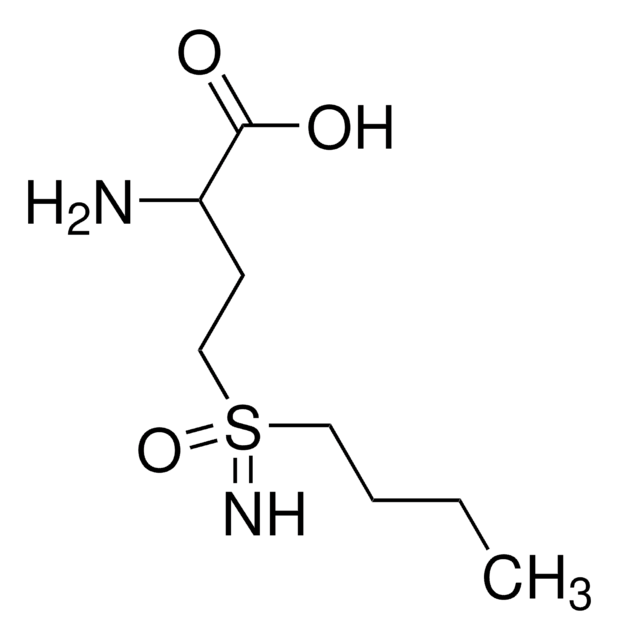About This Item
Recommended Products
biological source
synthetic (organic)
Quality Level
Assay
≥98% (TLC)
form
powder
mp
215 °C (dec.) (lit.)
solubility
water: 50 mg/mL, clear to very slightly hazy, colorless to yellow
storage temp.
2-8°C
SMILES string
CCCCS(=N)(=O)CCC(N)C(O)=O
InChI
1S/C8H18N2O3S/c1-2-3-5-14(10,13)6-4-7(9)8(11)12/h7,10H,2-6,9H2,1H3,(H,11,12)
InChI key
KJQFBVYMGADDTQ-UHFFFAOYSA-N
Looking for similar products? Visit Product Comparison Guide
General description
Application
- to induce oxidative stress in Starlings
- to deplete choroidal glutathione (GSH) in two-day-old rat pups
- to test its inhibitory effect on the enzymes, γ-glutamylcysteine synthetase and trypanothione synthetase (TryS) from T. cruzi
Biochem/physiol Actions
Features and Benefits
Signal Word
Warning
Hazard Statements
Precautionary Statements
Hazard Classifications
Eye Irrit. 2 - Skin Irrit. 2 - STOT SE 3
Target Organs
Respiratory system
Storage Class Code
11 - Combustible Solids
WGK
WGK 3
Flash Point(F)
Not applicable
Flash Point(C)
Not applicable
Personal Protective Equipment
Certificates of Analysis (COA)
Search for Certificates of Analysis (COA) by entering the products Lot/Batch Number. Lot and Batch Numbers can be found on a product’s label following the words ‘Lot’ or ‘Batch’.
Already Own This Product?
Find documentation for the products that you have recently purchased in the Document Library.
Customers Also Viewed
Articles
Discover Bioactive Small Molecules for ADME/Tox
Discover Bioactive Small Molecules for ADME/Tox
Discover Bioactive Small Molecules for ADME/Tox
Discover Bioactive Small Molecules for ADME/Tox
Our team of scientists has experience in all areas of research including Life Science, Material Science, Chemical Synthesis, Chromatography, Analytical and many others.
Contact Technical Service














